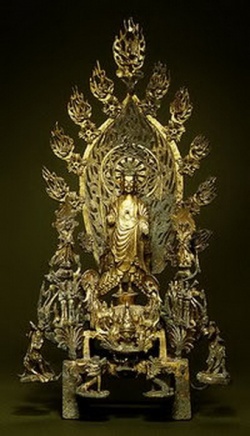Marana
'death', in ordinary usage, means the disappearance of the vital faculty confined to a single life-time, and therewith of the psycho-physical life-process conventionally called 'man, animal, personality, ego', etc. Strictly speaking, however, death is the continually repeated dissolution and vanishing of each momentary physical-mental combination, and thus it takes place every moment. About this momentaneity of existence, it is said in Vis.M. VIII:
"In the absolute sense, beings have only a very short moment to live, life lasting as long as a single moment of consciousness lasts. Just as a cart-wheel, whether rolling or whether at a standstill, at all times only rests on a single point of its periphery, even so the life of a living being lasts only for the duration of a single moment of consciousness. As soon as that moment ceases, the being also ceases. For it is said:
'The being of the past moment of consciousness has lived, but does not live now, nor will it live in future.
The being of the future moment has not yet lived, nor does it live now, but it will live in the future.
The being of the present moment has not lived, it does live just now, but it will not live in the future.'"
In another sense, the coming to an end of the psycho-physical life-process of the Arahat, or perfectly Holy One, at the moment of his passing away may be called the final and ultimate death, as up to that moment the psycho-physical life-process was still going on from life to life.
Death, in the ordinary sense, combined with old age, forms the 12th link in the formula of dependent origination (paticca-samuppāda).
For death as a subject of meditation, s. maranānussati; as a function of consciousness, s. viññāna-kicca.
